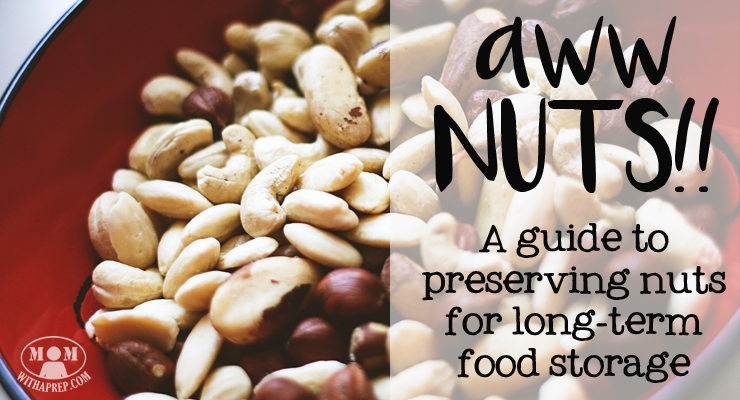
Proteins are one of those long-term food storage items that people worry about the most, especially if they aren’t canners. How do you store enough proteins to keep your family healthy without relying on canned meats from the grocer’s shelves? Nuts are a great option!
However, nuts and seeds aren’t great for long-term storage because of the fats and oils located inside that will go rancid after a while. This rancidity is caused by oxygenation. So we need to find a way to take care of that issue before we begin to store them long-term.
How to Best Store Nuts and Seeds in 5 Easy Ways?
1. Freezing for Long-Time Storage
The easiest way to store your nuts and seeds is to freeze them. This inhibits the oils and fats from going rancid. You don’t even have to flash freeze them, I just throw them in freezer storage bags for short-term use (the ones I use a lot, like snacking on pecans because they’re my favorite!), or use a vacuum sealer for longer storage. Remember, while the freezer is a great way to help preserve your food storage, you shouldn’t count on it as your sole storage option because of the risk of power failures.
2. Soaking & Dehydrating
Soaking nuts and seeds allow them to release their enzyme inhibitors, making them easier to digest for us and giving us more nutrition from them. Dehydrating them allows them to be crunchy the way we’re so used to having them. Then you can proceed to your normal long-term storage options. It really is as simple as soaking, draining, and throwing on a dehydrator. Check out the tutorial at GNOWFGLINS on the exact way to do it (though… my ‘el-cheapo’ dehydrator is a champ and has been running for a couple of years now full force without a problem at all!)
3. Making Roasted Peanut Butter and Storing
Peanut butter won’t last forever, but it’s another option for getting good fats and proteins into your diet. It can store in a cool place for a while, even without refrigeration, especially for those of you who have good, cool root cellars. But refrigeration definitely allows it a better shelf-life. The non-organic peanut butter that you purchase at the store has preservatives in them to help the peanut butter last longer on the shelf.
4. Canning Nut Meat for Long-Time Storage
There are two schools of thought about canning nuts. One school says the risk of salmonella is very low, but a risk, thus the USDA canning regulations don’t offer a procedure to can nuts. The National Center for Home Food Preservation has withdrawn its information on how to can any nut meat, with the exception of green peanuts (which we all know are really legumes). The risk of moisture seeping into the jars during the canning process is where the risk really lies. So while you might find some instructions on canning nut meat from the second school of thought, do so with the understanding that the USDA considers there to be some risk.
5. Vacuum Canning Nut Meat
If you have a Food Saver a Rival Seal a Meal or other vacuum sealer, you can use their canning jar attachments to vacuum ‘can’ your nut meat into canning jars. This helps keep them fresher than if you just kept them in a jar. Be sure to add an O2 absorber into each jar and/or a silicone gel pack (to help reduce moisture). You are not canning in the traditional sense of the word, but taking out the air which is one of the biggest reasons things go bad.
Learn more about infographic design with Lemonly.
YOUR THOUGHTS: What are your favorite nuts or seeds to store?
Tom is a Marketing & Communications graduate interested in nature, gardening, agriculture, and traveling. For the last decade, Tom has turned his hobbies into a full-time job, creating useful resources and guides for all our readers. If he is not working on his next article, you will find Tom spending quality time with family or taking care of his own back garden.
Last update on 2023-03-23 at 15:00 / Affiliate links / Images from Amazon Product Advertising API

